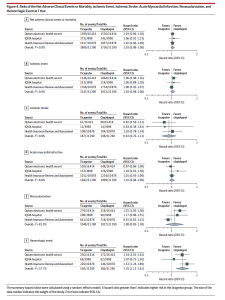 Ticagrelor, when compared with clopidogrel, was not associated with better outcomes for patients with acute coronary syndrome (ACS) treated with percutaneous coronary intervention in contemporary routine clinical practice according to a study published recently by the Observational Health Data Sciences and Informatics (OHDSI) community.
Ticagrelor, when compared with clopidogrel, was not associated with better outcomes for patients with acute coronary syndrome (ACS) treated with percutaneous coronary intervention in contemporary routine clinical practice according to a study published recently by the Observational Health Data Sciences and Informatics (OHDSI) community.
These findings raise doubts about current clinical guidelines for ACS treatment, which recommend ticagrelor over clopidogrel based on the findings of a single large sponsor-initiated clinical trial, PLATO, which was published in 2009.
This global network study, which included more than 60,000 patients with acute coronary syndrome who underwent PCI from two United States electronic health record-based databases and one nationwide South Korean database, is intended to provide greater detail about the characteristics of patients suffering from the disease, and also to help inform decision-making around the care of patients with ACS.
The study “Association of Ticagrelor vs Clopidogrel With Net Adverse Clinical Events in Patients With Acute Coronary Syndrome Undergoing Percutaneous Coronary Intervention” was published Oct. 27, 2020 by JAMA.
In this observational cohort study, the 1-year risk of net adverse clinical events (NACE), defined as composite of ischemic events (recurrent myocardial infarction, revascularization, or ischemic stroke) and hemorrhagic events (hemorrhagic stroke or gastrointestinal bleeding), was not significantly different between ticagrelor and clopidogrel (Hazard ratio 1.05; 95% CI 1.00–1.10). There was also no significant difference in the risk of ischemic events (Hazard ratio 1.03 [95% CI 0.98–1.08]; P = .32).
The risks of hemorrhagic events (Hazard ratio 1.35 [95% CI 1.13–1.61]) were significantly higher in the ticagrelor group than the clopidogrel group.
“Interventional cardiology has achieved numerous advances at a rapid pace. There is no guarantee that the results of the single large trial a decade ago are still valid in contemporary real-world clinical practice.” said co-lead author Seng Chan You. “Recently, POPular AGE and TICA-KOREA study have already demonstrated that clopidogrel can be a favorable alternative to ticagrelor in European elderlies and Korean patients with ACS, who are usually underrepresented in randomized clinical trials including PLATO. Our study suggests that this may be true for overall patients with ACS who underwent PCI.”
The study was developed and executed by the OHDSI community, a multi-stakeholder, interdisciplinary collaboration that works to bring out the value of health data through large-scale analytics. All solutions are open-source, and links to the study protocol, code and results are posted in the paper. All analyses are performed at the individual sites, meaning no patient-level data needed to be shared and patient privacy could be maintained.
“The use of ticagrelor increased rapidly worldwide, which might have reduced the overall adherence of P2Y12 inhibitors after PCI and exacerbated socioeconomic disparities,” said co-lead author Yeunsook Rho. “This study shows how the nationwide longitudinal data of the Korean Health Insurance Review & Assessment Service (HIRA) can be used to fill the gaps in current medical evidence. It is foundational work for future collaborative evidence generation by both OHDSI and HIRA, which aim to generate reliable evidence by using real-world data for better understanding of health and disparity.”
“This study has allowed us to better understand the comparative effectiveness and safety of ticagrelor compared to clopidogrel in patients with ACS, who underwent PCI” said Rae Woong Park, co-senior author on this study. “Most established medical evidence has been generated for the Western population. Distributed research networks based on standardized observational databases allow us to test the consistency of current evidence for the global community.”
About This Study
Co-lead author Seng Chan You, MD is a PhD student at Ajou University.
Co-lead author Yeunsook Rho is director of Big data research division at Health Insurance Review and Assessment Service.
Co-senior author Rae Woong Park, MD, PhD, is Professor and Chairman of Biomedical Informatics at Ajou University.
Co-senior author Harlan Krumholz, MD, SM, is Harold H. Hines, Jr. Professor of Medicine (Cardiology) and Professor in the Institute for Social and Policy Studies, of Investigative Medicine and of Public Health (Health Policy); Director, Center for Outcomes Research and Evaluation (CORE) at Yale University.
All other authors can be found in the paper.
